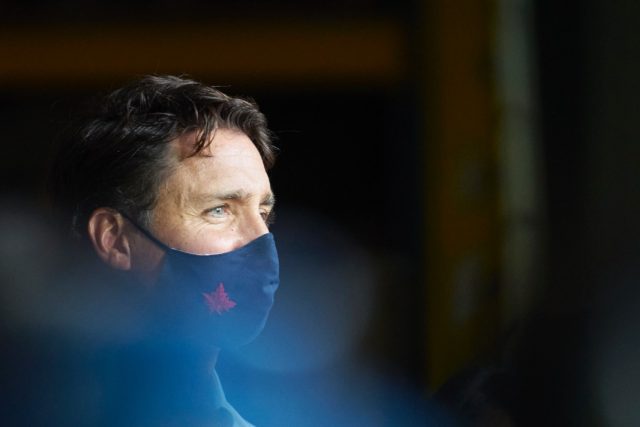Justin Trudeau believed his adept response to the pandemic would help him handily win re-election as prime minister, but going into Monday’s Canadian ballot he suddenly finds himself fighting for his political survival.
The first-born son of the late prime minister Pierre Trudeau had swept to power in a landslide in 2015, with a mop of dark curly hair and confident swagger, jumping into crowds to take selfies with adoring young fans.
Six years later, at 49, he has faced a barrage of criticism on the campaign trail, and even threats.
After doling out hundreds of billions of dollars in Covid aid to workers and businesses, Trudeau triggered the snap election seeking to regain the majority in parliament he’d lost in 2019.
But instead the Liberal prime minister finds himself in a horse race with rookie Tory leader Erin O’Toole.
“He’s gone from golden boy to veteran pugilist throwing whatever punches are necessary to stay in the ring,” said pollster and former political strategist Tim Powers.
“The scars of leadership are mounting and it’s obviously impacted his disposition and desire to win, and now requires more of a ruthlessness as opposed to a hopefulness,” he told AFP.
Missed high expectations
The world watched with interest, even admiration, as Trudeau proclaimed in 2015 after almost a decade of Tory rule: “Canada is back!”
“Why can’t he be our president?” shouted a Rolling Stone magazine cover from the United States featuring Trudeau.
Now, fatigue with his administration is palpable.
Past scandals have re-emerged, including his firing of Canada’s first indigenous attorney general for accusing Trudeau of meddling in the bribery prosecution of engineering giant SNC-Lavalin.
Combined with missed high expectations, these have plunged the Liberal leader’s popularity.
And he’s been dogged at rallies by protestors he described as “anti-vaxxer mobs,” some of whom threw stones at the prime minister.
There has also been pushback over the timing of Trudeau’s call for an election, only 18 months after the last vote and just as the nation emerges from pandemic lockdowns.
“This is an election that is going to determine the government that will be taking really big decisions for Canadians in the coming weeks and months, not two years from now when the next scheduled election was supposed to be,” Trudeau said this week, addressing the backlash.
He highlighted “stark” policy differences between his party and rival parties on mandatory vaccinations, child care and the environment, and emphasized the need for a new mandate to steer Canada’s pandemic exit.
But he has been unable to rekindle the spark of his 2015 campaign, which had not been seen in Canadian politics since the “Trudeaumania” that hailed his father’s entry into politics a half century earlier.
“The enthusiasm and excitement that greeted Trudeau’s 2015 victory has vanished,” said University of British Columbia politics professor Max Cameron.
“Whether it’s climate change or reconciliation with indigenous peoples, for example, Trudeau has been less transformational than I think many people had hoped,” he explained.
Canada not global leader
The Trudeaus, with their political talent and film-star good looks, have often been compared to the Kennedys in the United States.
Coming late to politics after working as a snowboard instructor, bartender, bouncer and teacher, Justin Trudeau was first elected in 2008 to the House of Commons to represent a working-class Montreal neighborhood.
As prime minister, “he’s done some important things,” said Cameron, pointing to Senate reforms and a new trade deal with the United States.
The married father of three also legalized cannabis, held a public inquiry into missing and murdered indigenous women and passed legislation permitting medically assisted suicide.
And, said Cameron, the Liberals have “probably the best climate change plan” on offer, anchored on a carbon tax set to rise to Can$170 per tonne by 2030.
But Canada’s carbon emissions are not as low as many had hoped they would be by this point. And 32 indigenous communities, down from a peak of 111, are still under boil water advisories, according to government data, despite Trudeau’s pledge to fix the public health hazard in already marginalized areas.
On the world stage, Cameron said, “Canada has really not emerged as any sort of leader globally.”
“Canada was a country with a strong international voice, but under Trudeau we’ve been more spectators than players,” echoed Jocelyn Coulon, a former advisor to Trudeau.
Meanwhile, rivals have borrowed the positive and hopeful vision for Canada advanced by Trudeau, and the Conservatives’ tracking to the center in this campaign have forced the Liberals to stake out the left, where the party is now fighting with New Democrats and Greens for votes.
“This further complicates things for Trudeau,” who is being squeezed by New Democrat leader Jagmeet Singh suddenly more popular with young Canadians, and by O’Toole who is tops with older voters,” said University of Alberta politics professor Frederic Boily.

COMMENTS
Please let us know if you're having issues with commenting.